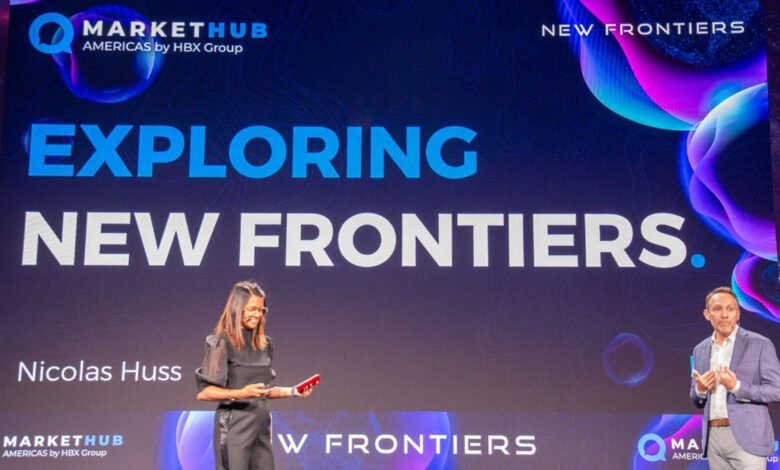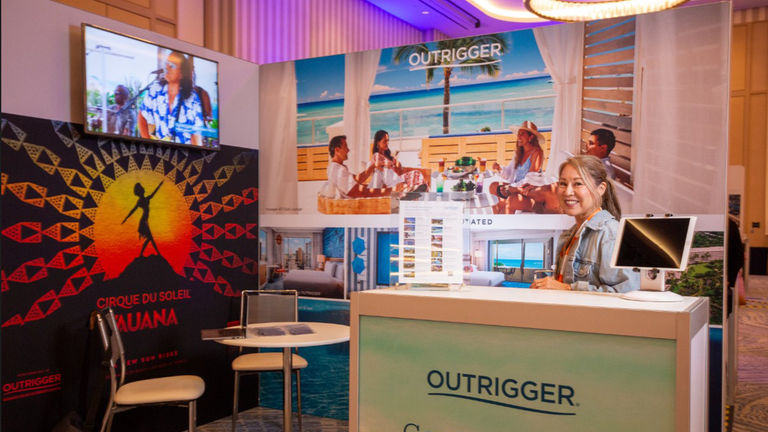What We Learned at HBX Group’s Annual MarketHub Americas

Earlier this month, HBX Group welcomed more than 500 travel professionals to Las Vegas for its annual MarketHub Americas conference. This year’s event focused on “new frontiers” in travel, and was held at the recently opened Fontainebleau Las Vegas.
Executives from HBX Group were joined by Google Travel, Virtuoso, the World Travel & Tourism Council (WTTC), the Las Vegas Convention and Visitors Authority, Resorts World Las Vegas, Hard Rock International, Fairmont Hotels & Resorts, Accor Hotels and others to discuss current and emerging travel trends, the health of the industry and how travel professionals can best position themselves in 2024 and beyond. What follows are key takeaways from the panels, keynotes and the tradeshow floor.
Expect 2024 to Shatter Previous Travel Records
According to research presented by Adolfo Reyes, head of membership and associates at the WTTC, global travel is recovering despite economic uncertainties and geopolitical issues. Post-pandemic, consumers have demonstrated a tolerance to rising prices, and 2024 is poised to be a record year for the industry. Travel and tourism’s contribution to global GDP is predicted to reach $11.1 trillion (a year-over-year increase of 12.1%). This growth translates to an additional 348 million jobs in travel and tourism globally. To put it into perspective, that accounts for more jobs than the entire population of the United States.
With travel and tourism contributing 8.1% of global greenhouse gas emissions, Reyes spoke about the increasing climate crisis and the responsibility of the travel industry to protect the Earth’s resources.
RELATED: How to Better Understand — and Book — Sustainable Travel
“Our sector will grow but not at any cost; we need to do more, like prioritizing nature-positive solutions and reducing absolute emissions,” he said, suggesting the industry decouple growth from emissions and invest in sustainable practices. “We all have a role to play as travelers, as travel providers and as travel suppliers.”
Our sector will grow but not at any cost; we need to do more, like prioritizing nature-positive solutions and reducing absolute emissions.
All Eyes Are on Gen Z Travelers
Understanding the new generation of travelers was top of mind throughout the conference. Gen Z represents 21% of the U.S. population, making them the second-largest generation behind millennials. Most importantly, Gen Z is showing an appetite for travel.
“The new frontier is already here — it’s Gen Z,” said Nicolas Huss, CEO of HBX Group. “What strikes me is that they book very late. Their loyalty to a brand is much lower than what we’ve experienced in the past, but at the same time, they really like packages, and sustainability is non-negotiable to them. We’ll have to adapt to that.”
The new frontier is already here — it’s Gen Z.
According to Una O’Leary, general manager, Canada for Virtuoso, Gen Z and millennials are increasing their travel in 2024.
“We’re seeing that [younger generations] are willing to pay more for travel products, so they don’t have to do the work,” she said. “They want to ensure the preservation of cultural heritage by applying their dollars to environmentally friendly practices that benefit local people, communities and cultures. Therefore, we want to educate advisors that, when they are talking about sustainability, it’s not about plastic straws anymore. It’s about how our travel partners are investing in the community and ensuring that we’re leaving less of a footprint.”
RELATED: Survey Shows Millennials and Gen Z Are Turning to Travel Agents
Advisors Should Embrace Generative AI Tools
For travel advisors, one of the hottest topics of the year has been how artificial intelligence (AI) could impact the profession and the industry at large. For many, there’s a sense of awe when it comes to generative AI’s herculean abilities, as well as a concern that the advisor’s role could be diminished over time.
Rebby John, senior director of global sales engineering for sales engagement platform Salesloft, encouraged travel professionals to embrace the change. He believes that generative AI can help deliver unforgettable client experiences that will sustain repeatable revenue growth.
“The value is realized when you use AI not to automate away the human, but to augment the human workflow across every different kind of role — and especially in sales — because you enable and elevate the human to do what they do best,” he said. “It’s simple. Let the human do what the AI can’t and let the AI do what the human can’t.”
RELATED: How Travel Advisors Can Get Ahead Using Artificial Intelligence
According to John, using generative AI tools should be a no-brainer for tasks such as marketing and sales email blasts, social media captions, blog posts or brainstorming webinar talking points.
“With generative AI, writer’s block should absolutely be a thing of the past,” John said. “As long as you have an idea, generative AI should be able to build a framework or maybe even a first draft. But it’s important to remember that’s what AI is — the first draft, not the final draft. If you’re using it to create content and just pushing it out to your clients, then you are going to make a mistake because that content is not going to match your tone of voice and the kind of experience that you want to deliver.”
As long as you have an idea, generative AI should be able to build a framework or maybe even a first draft.
Ultimately, he pointed out that higher-performing companies are the ones that are figuring out ways to augment and enhance the art and science of sales. And those who don’t evolve could fail to connect with travelers.
“The industry is at a crossroads,” John said. “The buyer journey is shifting; buyer behavior is shifting. That trend is going to accelerate with or without us. But what we do have control over is how we respond. You can either ignore the shift, stick your hand in the sand and continue to sell to the buyers today and tomorrow like they were the buyers of yesterday. And if you do that, I guarantee that you’ll alienate your client base and ultimately fade away into irrelevance. Or you can evolve with it. You can embrace this shift.”

Credit: 2024 HBX Group
Consumers Crave Frictionless Travel
HBX Group, whose brands include Bedsonline, sees the immense potential in simplifying the booking process for travel agencies and providing a more seamless travel experience for the end traveler. The B2B travel tech company — which added more than 23,000 new hotels to its portfolio last year and some 13,000 more this year — is enhancing its brands and tools in an effort to remove the friction that advisors face when booking trips, and reduce the hiccups clients experience throughout their travel journey.
“We continue to support the growth of our partners by helping you to adapt to changes in the market and to customer behavior,” said Carlos Munoz Capllonch, chief commercial officer of HBX Group. “What the market and customers are telling us is that the travel experience is full of friction and they want this friction to disappear.”
Some of these pesky pain points include having to book elements of a vacation on multiple sites, not being able to locate one’s hotel transfers, or arriving at a hotel only to find out that the room isn’t ready or the room category is no longer available.
“We are fully convinced that the next big move is to eliminate all these inefficiencies, and we are transforming ourselves into an ecosystem player by connecting multiple products and services, making use of our technology and our data, and providing this seamless experience for our partners in the B2B space,” Munoz Capllonch said.
HBX Group plans to connect accommodations, experiences, insurance, travel packages, in-destination services and other tech solutions in order to provide a better customer experience and ultimately drive revenue to agencies.
The Rise of Experience-Driven Travel
Bertrand Sava, general manager of Bedsonline, argued that travelers are no longer solely motivated by a change of scenery or relaxation. Instead, they prioritize experiences shaped by their interests.
“First, [clients] are thinking about what they want to do and the experience they want to live, and this is influenced by many inputs they’re receiving,” Sava said. “It’s only after that they think about where to go, when to go and how they’re going to book it.”
Sava explained that today’s travelers are increasingly planning trips around specific experiences, such as music concerts, movie/television filming locations and sporting events. These experiences can have a significant economic impact on destinations. For instance, Las Vegas reported over 300,000 visitors during this year’s Super Bowl LVIII weekend — that’s approximately five times the capacity of the stadium in which it was held. Furthermore, the newly opened Sphere in Las Vegas, with its immersive video and sound capabilities, helped U2 gross a record-breaking $6.4 million per show.
Sava encourages travel professionals to capitalize on increased spending associated with experience-driven travel. Whether self-proclaimed Swifties (Taylor Swift supporters) or devotees of Beyonce’s Bey Hive, fans are proving that they are willing to spend significantly in order to see their favorite artists perform.
“You need to capture the customer as early as possible and provide them with everything they need to make that experience unforgettable,” he said. “Please don’t overlook the importance of these opportunities. High demand translates to high margins.”
Source link



